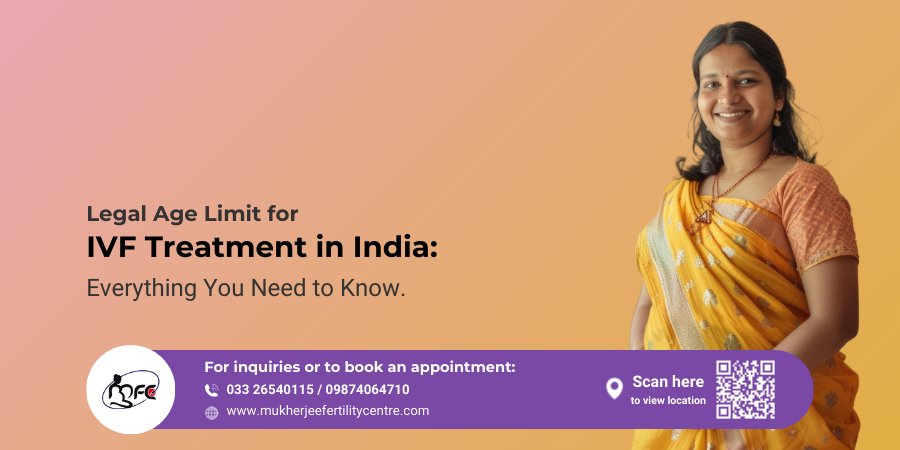
Legal Age Limit for IVF Treatment in India: Everything You Need to Know
By MFC on 03,Jul 2024
Over the past few years, In-Vitro Fertilization (IVF) has become a source of optimism for countless couples facing infertility challenges. It is crucial to have a clear understanding of the legal age limits and guidelines related to IVF treatment in India as this advanced reproductive technology continues to gain popularity. Dr. Shiuli Mukherjee, an esteemed fertility doctor at Mukherjee Fertility Centre (MFC) and a highly regarded gynecologist in Kolkata, offers valuable insights into the age limitations and various factors that impact IVF treatment.
Understanding IVF and Its Importance
IVF is a process where an egg is combined with sperm outside the body, and the resulting embryo is transferred to the uterus. This technique helps overcome various fertility issues, allowing many to achieve their dream of parenthood.
Age Limit for IVF Treatment in India
- Legal Age Restrictions:
- Maximum Age for IVF:
- Minimum Age for IVF in India:
- Best Age for IVF:
In India, the legal guidelines for IVF treatment specify that the age of the woman undergoing the procedure should ideally be between 21 and 50 years, while the age of the male partner should be between 21 and 55 years. These limits are designed to ensure the safety and well-being of both the mother and the child.
The upper age limit for women using their own eggs is generally recommended to be around 45 years. However, with the use of donor eggs, women up to the age of 50 can still consider IVF. The maximum age for men undergoing IVF treatment is typically set at 55 years.
The minimum age for IVF treatment is 21 years for both men and women. This ensures that both partners are legally adults and capable of making informed decisions about their fertility treatments.
While IVF can be performed at various ages, the best age range for a successful outcome is generally between 25 and 35 years. During this period, women typically have a higher ovarian reserve and better egg quality, which are crucial for a successful pregnancy.
Factors Influencing Age Limits for IVF
- Ovarian Reserve:
- Health and Fitness:
- Medical Advancements:
A woman’s ovarian reserve, which refers to the number and quality of her eggs, diminishes with age. Younger women tend to have a higher ovarian reserve, increasing the chances of successful IVF.
Overall health and fitness play a significant role in the success of IVF treatments. Older individuals may face more health-related complications that can affect fertility and pregnancy outcomes.
Advancements in medical technology and fertility treatments have enabled older women to conceive through IVF, particularly with the use of donor eggs. However, these procedures come with their own set of risks and considerations.
FAQs on Legal Age Limit for IVF Treatment in India
- Is there a strict legal age limit for IVF treatment in India?
- Can women above 45 years undergo IVF with their own eggs?
- What is the best age to undergo IVF treatment?
- Can men of any age undergo IVF treatment?
- Are there any exceptions to the age limits for IVF in India?
- How do age limits for IVF in India compare to other countries?
- Can women over 50 undergo IVF in India?
- What are the legal implications of undergoing IVF beyond the recommended age limits?
- Is there a penalty for exceeding the age limit for IVF in India?
- How does Dr. Shiuli Mukherjee and Mukherjee Fertility Centre support older couples seeking IVF?
Yes, the legal age limits for IVF treatment in India are 21 to 50 years for women and 21 to 55 years for men. These guidelines are established to ensure the safety and effectiveness of the treatment.
While it is technically possible, it is not commonly recommended due to the significantly lower chances of success and higher risks of complications. Women above 45 years are often advised to consider donor eggs.
The optimal age range for IVF treatment is between 25 and 35 years. During this period, women typically have a higher ovarian reserve and better egg quality, enhancing the chances of a successful pregnancy.
While men can technically father children at older ages, the legal age limit for male partners undergoing IVF treatment in India is 55 years. This ensures both partners are within a reasonable age range for parenting.
Exceptions to the age limits are rare and typically only considered under special circumstances. It’s important to consult with a qualified fertility specialist to understand your options.
Age limits for IVF vary by country. For example, in the USA, there is no federal legal age limit, but individual clinics may set their own guidelines. In the UK, the National Health Service (NHS) generally offers IVF to women under 40, with some exceptions for women up to 42.
Women over 50 can undergo IVF using donor eggs, provided they meet the health and fitness criteria set by the fertility clinic. It’s essential to discuss the risks and benefits with a qualified fertility specialist.
Undergoing IVF beyond the recommended age limits can involve legal and medical risks. It’s important to adhere to the guidelines and seek advice from a reputable fertility clinic to avoid complications.
While there is no specific legal penalty for exceeding the age limit, it is crucial to follow the guidelines for the safety and well-being of both the mother and child. Exceeding the age limit without proper medical advice can lead to health complications.
Dr. Shiuli Mukherjee and the team at Mukherjee Fertility Centre provide personalized care and advanced fertility treatments to support older couples. They offer comprehensive evaluations and tailored treatment plans to maximize the chances of success while ensuring the safety and health of the patients.
Conclusion
Understanding the legal age limits for IVF treatment in India is essential for anyone considering this advanced reproductive technology. Adhering to these guidelines helps ensure the safety and success of the treatment. Dr. Shiuli Mukherjee and Mukherjee Fertility Centre are committed to providing the best care and guidance for individuals and couples on their fertility journey.
For more information or to schedule a consultation, visit Mukherjee Fertility Centre’s website or contact us directly. Let us help you make informed decisions about your fertility treatment options.









